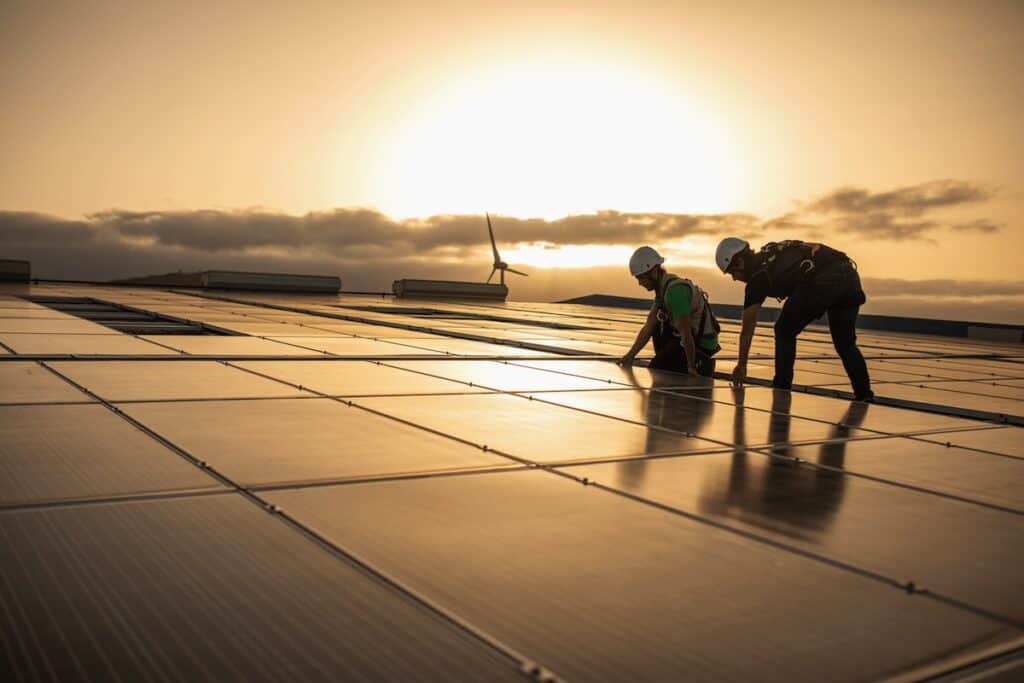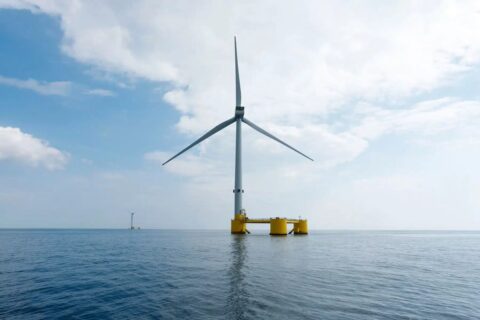
The energy transition is set to create 40 million additional jobs by 2050, however, new research warns opportunities will be unevenly distributed without progressive policies to share socio-economic benefits.
In time for COP28 in Dubai, the International Renewable Energy Agency (IRENA) published Volume 2 of its influential World Energy Transitions Outlook (WETO) 2023. Forecasting clean and green growth, the report shows that the world could witness an average annual increase in GDP of 1.5% by 2050 under the 1.5°C pathway compliant with the Paris Agreement (when compared to the Planned Energy Scenario).
The good news for employment is that the energy transition is also expected to create 40 million additional jobs in the energy sector by 2050, with 18 million more jobs globally in renewables alone.
The not-so-good news is these jobs are unlikely to be spread fairly worldwide, without shifts in policy.
More to a just transition than just tech
This second volume of the Outlook builds on the foundations laid down in WETO Volume 1, released earlier this year. That first publication presented a pathway to achieve the 1.5°C target, positioning electrification and efficiency as key transition drivers, enabled by renewables, clean hydrogen and sustainable biomass.
WETO Volume 1 also warned that the energy transition is currently off-track, demanding urgent and radical action including a tripling of installed renewable energy capacity by 2030.
At COP28 this month, Heads of State have now agreed to triple global renewable energy capacity by 2030, aligning with IRENA’s original WETO call to action.
More to a just transition than tech alone
Moving the focus, WETO Volume 2 outlines the socio-economic impacts of IRENA’s 1.5˚C Scenario.
It provides policymakers with insights into how economic activity, employment and human welfare will be affected by 1.5°C and helps governments design policies that maximise the benefits of the transition.
There is more to a just transition than tech alone, explains IRENA Director-General Francesco La Camera:
“Bridging gaps in climate policy ambition and fostering essential structural changes places unprecedented demands on policymakers. But policymakers have predominantly concentrated on the technological facets of the energy transition, often overlooking its socio-economic implications.“
Equality of opportunity is critical to economic sustainability, concludes La Camera:
“The energy transition holds great promise for boosting the global economy, but we must address persistent inequality. We must facilitate positive transition outcomes while ensuring that these opportunities are equitably distributed across regions and countries.”
Call for holistic approach to tackle inequality
IRENA’s socio-economic analysis finds the impacts of the transition vary across regions and countries, highlighting disparities in economic development and underscoring the need for inclusive strategies.
Although the renewable sector employment is expected to triple by 2050 overall, jobs are unevenly distributed across regions. Asia is expected to hold 55% of global renewable jobs by 2050, followed by Europe at 14% and the Americas at 13%. Only 9% of the jobs would be in Sub-Saharan Africa.
And while Africa’s per capita GDP is set to double, the continent’s resource-rich countries will likely see faster growth, exacerbating regional inequalities. Yet, emerging economies like India and China are poised for significant growth, potentially reshaping the global economic landscape.
Drivers for economic outcomes differ, underscoring the need to proactively support spending in developing countries. For G20 countries, investment and trade are the strongest drivers. For developing countries, induced social-directed payments are often the dominant factor in GDP differences.
Connecting the socio-economic and technological facets of the energy transition necessitates policy interventions that transcend merely shifting from fossil fuels to renewables.
In response, IRENA has consistently been calling for a holistic approach to energy transition, intertwining international collaboration, equity, and systemic changes as integral constituent parts.
Outlook 2023 and first Global Stocktake at COP28
IRENA’s World Energy Transitions Outlook (WETO) provides a pathway in line with Paris Agreement goals, limiting global temperature rise to 1.5°C. The 2023 edition will also contribute to the first United Nations Framework Convention on Climate Change (UNFCCC) Global Stocktake, which concludes at COP28.
IRENA is the lead intergovernmental agency for the global energy transformation that supports countries in their transition to a sustainable energy future. With 169 Members (168 States and the European Union), plus 15 additional countries in the accession process and actively engaged, IRENA promotes the widespread adoption and sustainable use of all forms of renewable energy in the pursuit of sustainable development, energy access, energy security and low-carbon economic growth and prosperity.
Further Reading:
- More on the IRENA World Energy Transitions Outlook 2023 (Volume 2); and also Volume 1;
- More about the International Renewable Energy Agency (IRENA), in general;
- More on the voluntary agreement at COP28 to triple global renewable energy capacity by 2030;
- More on why the UNFCCC Global Stocktake is important; plus latest on its progress at COP28;
- Also on SustMeme, Energy transition drives boom in biofuel production;
- Also on SustMeme, Call to invest $35 trillion in transition tech by 2030;
- Also on SustMeme, Key role for third sector in climate finance (Guest Blog);
- Also on SustMeme, LDES: ‘Future of Energy’ in ‘The Times’;
- Also on SustMeme, Energy transition investment hits $500 billion for first time;
- Also on SustMeme, Millions of jobs in circular economy for Global South;
- Also on SustMeme, Is Net Zero the first casualty in fight for votes?
Check out the full archive of stories on the SustMeme Climate & Energy Channel, now available to Sponsor.






